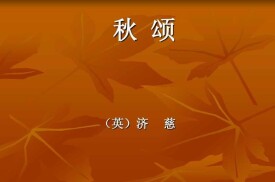秋頌
秋頌
《秋頌》為濟慈所作的一首詩歌。濟慈,全名約翰·濟慈John Keats(1795年—1821年),出生於18世紀末年的倫敦,他是傑出的英國詩作家之一,也是浪漫派的主要成員。
濟慈,全名約翰·濟慈John Keats( 1795年—1821年),出生於18世紀末年的倫敦,他是傑出的英國詩作家之一,也是浪漫派的主要成員。其一生寫出了大量的優秀作品,其中包括 《聖艾格尼絲之夜》《秋頌》《夜鶯頌》等名作,表現出詩人對大自然的強烈感受和熱愛,為他贏得巨大聲譽。濟慈詩才橫溢,與 雪萊、拜倫齊名。他生平只有25歲,但其遺下的詩篇一直譽滿人間,被認為完美地體現了西方浪漫主義詩歌的特色,並被推崇為歐洲浪漫主義運動的傑出代表。他主張“美即是真,真即是美”,擅長描繪自然景色和事物外貌,表現景物的色彩感和立體感,重視寫作技巧,語言追求華美,對後世抒情詩的創作影響極大。
To Autumn
John Keats
I.
Season of mists and mellow fruitfulness,
Close bosom-friend of the maturing sun;
Conspiring with him how to load and bless
With fruit the vines that round the thatch-eves run;
To bend with apples the moss’d cottage-trees,
And fill all fruit with ripeness to the core;
To swell the gourd, and plump the hazel shells
With a sweet kernel; to set budding more,
And still more, later flowers for the bees,
Until they think warm days will never cease,
For Summer has o’er-brimm’d their clammy cells.
II.
Who hath not seen thee oft amid thy store?
Sometimes whoever seeks abroad may find
Thee sitting careless on a granary floor,
Thy hair soft-lifted by the winnowing wind;
Or on a half-reap’d furrow sound asleep,
Drows’d with the fume of poppies, while thy hook
Spares the next swath and all its twined flowers
And sometimes like a gleaner thou dost keep
Steady thy laden head across a brook;
Or by a cyder-press, with patient look,
Thou watchest the last oozings hours by hours.
III.
Where are the songs of Spring? Ay, where are they?
Think not of them, thou hast thy music too,
While barred clouds bloom the soft-dying day,
And touch the stubble plains with rosy hue;
Then in a wailful choir the small gnats mourn
Among the river sallows, borne aloft
Or sinking as the light wind lives or dies;
And full-grown lambs loud bleat from hilly bourn;
Hedge-crickets sing; and now with treble soft
The red-breast whistles from a garden-croft;
And gathering swallows twitter in the skies.
1
霧氣洋溢,果實圓熟的秋,
你和成熟的太陽成為友伴;
你們密謀用累累的珠球,
綴滿茅檐下的葡萄藤蔓;
使屋前的老樹背負著蘋果,
讓熟味透進果實的心中,
使葫蘆脹大,鼓起了榛子殼,
好塞進甜核;又為了蜜蜂
一次一次開放過遲的花朵,
使它們以為日子將永遠暖和,
因為夏季早填滿它們黏巢。
2
誰不經常看見你伴著穀倉?
在田野里也可以把你找到,
你有時隨意坐在打麥場上,
讓髮絲隨著簸谷的風輕飄;
有時候,為罌粟花香所沉迷,
你倒卧在收割一半的田壟,
讓鐮刀歇在下一畦的花旁;
或者,像拾穗人越過小溪,
你昂首背著谷袋,投下倒影,
或者就在榨果架下坐幾點鐘,
你耐心地瞧著徐徐滴下的酒漿。
3
啊.春日的歌哪裡去了?但不要
想這些吧,你也有你的音樂——
當波狀的雲把將逝的一天映照,
以胭紅抹上殘梗散碎的田野,
這時啊,河柳下的一群小飛蟲
就同奏哀音,它們忽而飛高,
忽而下落,隨著微風的起滅;
而群羊在山圈裡高聲默默咩叫;
籬下的蟋蟀在歌唱,在園中
紅胸的知更鳥就群起呼哨;
叢飛的燕子在天空呢喃不歇。
(查良錚譯)
